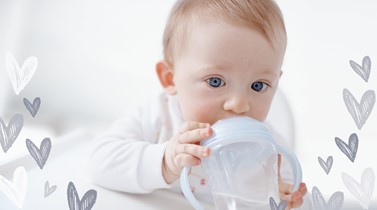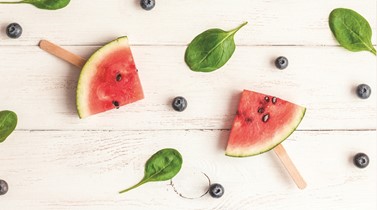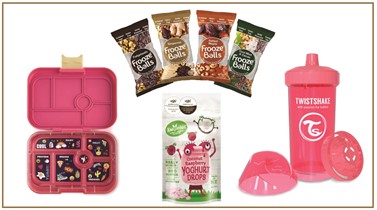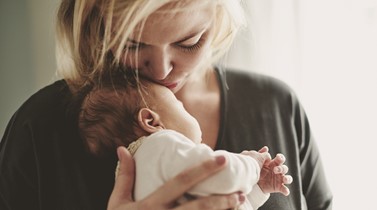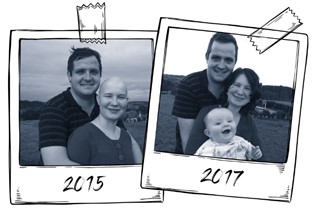Making the most of the first 1000 days. Part One: Pregnancy

This is the first in our series of four articles, focussing on the 250 days (approximately) that span conception to birth. We know every parent instinctively wants to give their child the best possible chance to reach their full potential, so we’ve approached the experts for ‘inside’ knowledge and practical advice. Here’s how to best support your body, mind and soul as you go about the momentous task of growing new life.
A lot happens at conception. If you had microscopic x-ray vision you’d see one champion sperm whipping ahead of the pack and hitting the jackpot, fusing with an egg in the epitome of a beautiful collision. If you had ultrasonic hearing, perhaps you’d detect that beautiful collision, followed by the low slow rumble of this blastocyst continuing its mission down the fallopian tube. And perhaps you’d also register something else going on: a subtle kind of cross-fade. That pervasive biological clock would soften and retreat into the background, while a new variety of ticking clock would start to grow in decibels: the first 1000 days.
In 2008, The Lancet medical journal published a series of papers which identified a critical and unparalleled window of time between the start of a woman’s pregnancy and her child’s second birthday where nutrition lays the foundation for a person’s lifelong health and wellbeing, and potentially even the next generation. This period of time, 1000 days, became the driving force behind an international campaign to raise awareness of this window, and advocate for greater action and investment in maternal and child nutrition. A 2013 follow up series acknowledged interventions are not only needed in developing countries, but also in countries where poor nutrition is the result of cheaper foods, and unbalanced and contaminated diets. In NZ we’ve picked up the first 1000 days term to reference not only nutrition, but also a range of important influences on development, including lifestyle and relationships. 

You are what you eat
Hannah Gentile, of Nourished By Nature, is a clinical nutritionist who provides nutrition support and advice for conception, pregnancy, starting solids and fussy eating.
We are uncovering that the first 1000 days are possibly the most important period of our lives for deter-mining our health outcomes as adults.
Time Magazine describes pregnancy health as ‘biological postcards’ from mother to baby; information on a mother’s body composition and nutrition being sent to the baby and encoded into baby’s flesh and bones. It seems that while, yes, we all have genes which code for diabetes, heart disease and cancer, whether or not they actually get switched on is largely down to our nutrition at this early stage.
Nutrition is instrumental in becoming pregnant, having a healthy pregnancy, and ultimately a healthy child. Low nutrient stores prior to getting pregnant can affect your ability to conceive and maintain a healthy pregnancy. Women who are underweight or overweight can have low nutrient stores. Simply consuming enough calories doesn’t mean you are getting the right vitamins and minerals. So which ones should you focus on?
MELLOW WITH YELLOW
Orange and yellow fruit and vegetables contain folate and Vitamin C which aid sperm production and mobility, as well as female reproduction and early embryo development. Dose up on oranges, red pepper, mangos, pumpkin, kumara, carrots, apricots, papaya and peaches.
EAT YOUR GREENS
Vegetables such as broccoli, spinach, asparagus, lentils, chickpeas, beans (pinto, kidney, lima, black and mung), lettuce, and avocado contain high levels of folic acid or folate. Folate helps with foetal development early on. A high intake can prevent issues with the embryo, lowering the risk of early miscarriage. It is best to increase your intake three months prior to trying to conceive.
LEARN YOUR FATS
Saturated fat is found around the skin of meat, in full-fat dairy products and in fast foods. Excessive saturated fat can lead to weight gain (harming egg development and cell division in the embryo) and can impair ejaculation in men. Fast foods should be limited to once a fortnight or less often. Opt for leaner choices of meat, eg heart-healthy mince, pork, turkey, chicken without the skin, and lots of fish.
In contrast, ‘good’ fats such as your Omega-3s are great for your health, as well as brain development in embryos. Almonds, fish, hazelnuts, avocado, flax seeds, walnuts, and soybeans all contain Omega-3s. They also tend to be high in Vitamin E, which has an important role in hormone balance. These have been found particularly beneficial in women with Polycystic Ovary Syndrome (PCOS), who have a higher risk of early miscarriage.
BRING ON THE SELENIUM
Selenium is in foods such as Brazil nuts, tuna, shellfish, snapper, wholemeal bread, seeds, white meat, mushrooms, rye and brown rice. A deficiency in this mineral can reduce sperm count for men and cause infertility in women.
How much should you eat?
To be healthy when you conceive, your diet doesn’t have to be drastically different from normal. You should be focussed on:
⭐ 5+ servings of fruit and non-starchy vegetables every day. One serving of non-starchy vegetables would roughly fit in two cupped hands. One serving of fruit would fit in one cupped hand.
⭐2-3 servings of milk and/or other dairy food
⭐2 servings of protein each day, eg meat, eggs, nuts, legumes and tofu. A serving is generally palm sized.
⭐1.5-2 litres of water
⭐5-6 servings of carbohydrate or starchy vegetables each day, for example, rice, potato, kumara, pumpkin, wholegrain bread, pasta and breakfast cereal. A serving is around the size of your fist.
Ditch alcohol and cigarettes
Seems like a no-brainer, right? But here is the catch - your partner will have to ease up too. Alcohol consumption in men is linked with lower levels of healthy sperm. Cigarettes lower the total number of sperm and make them lazy swimmers. Alcohol and cigarettes also cause hormone imbalance with increased risk of miscarriage early on. There are some mixed messages around alcohol during pregnancy. That sip of champagne at your sister’s wedding may seem harmless but the safest option is to have no alcohol at all. Drinking alcohol on regular occasions puts your baby at risk of foetal alcohol syndrome as alcohol crosses the placental membrane causing brain damage and other birth defects. The reality is, we are talking about nine months out of your life. You can do it!
Only eat for one
This myth of being able to eat for two during pregnancy has been well and truly debunked by now. Nutritional medicine shows us that, in actuality, women only need roughly one or two extra snacks a day to keep up with the additional energy demands during pregnancy. This is around 300 calories. Recent research suggests that women who are overweight or obese during pregnancy, or who put on excessive amounts of weight during pregnancy, are more likely to give birth to children who continue to have issues with their weight through their lifetime (as it alters the way the children metabolise fats and carbohydrates).
Cut back on sugar
Cutting back on refined sugars is probably one of the best things you can do for yourself and your unborn baby. Sugar has several issues for a growing baby. First it very easily crosses the placenta, causing a spike in baby’s blood sugar levels and, in turn, an insulin response. In a foetus, insulin is a growth hormone. This means that the more your baby produces, the more he grows. In short, the more sugar you eat, the larger your baby. So what is wrong with a big baby? Well, we all want a healthy chubby baby, no question about that. However, if your baby has grown bigger than he was designed to, it means that his vital organs, and the placenta, will have a whole lot of extra stress placed on them. Extra stress on vital organs, such as the heart, cause the muscle cells to toughen, which is what you see in later life in heart disease.
Sugar also increases the sweet receptors in the growing baby’s gut, implanting a memory for desiring sweeter foods. In addition, if a mother has good control of her blood sugar levels during pregnancy, it will greatly decrease the baby’s risk of ever developing diabetes later in life.
Focus on the nutrients
Babies born to mothers who ate low quality foods during pregnancy are far more likely to be premature and lower in birth weight. This lack of nutrients translates to resources being sent to the most vital organ first - the brain. This means that other organs, such as the heart, do not have adequate resources dedicated to their construction, increasing the risk of heart disease in later life. In practical terms, we need to eat plenty of fruit, vegetables, whole grains and proteins - such as red meat, fish, chicken, eggs, nuts and legumes - for organ health.
Take heart
Far from these links being yet another burden for women to worry about when pregnant, the exciting thing to realise is that this research gives any mother hope that they can actually control the health outcome of their child. It’s a beautiful realisation: we actually have the ability to shape our children’s destinies from our womb.
MEAL IDEAS
Breakfast
⭐ Super mix - grind almonds, sunflower seeds and linseed into a rough powder mix. Have 1-2 tablespoons per day in smoothies. You can add pumpkin seeds or other types of nuts too.
⭐ Buckwheat pancakes with fruit and a drizzle of honey.
⭐ Gluten-free or wholegrain toast with poached eggs, and a banana and berry smoothie (with yoghurt).
⭐ Porridge - rolled oats with mixed berries or other fruit and a drizzle of honey.
⭐ Bran flakes - with A2 or skim milk and fruit.
Lunch
⭐ Wholegrain sandwich with beef, chicken, turkey or lamb filling. Add in some mixed dark greens, seeds, and wheat germ oil dressing.
⭐ Salad, as above, without the bread if not wanted. Can add in boiled egg, oranges, poached peaches etc.
⭐ Finish off with some flavoured full-fat yoghurt or plain full-fat yoghurt with fruit.
⭐ Smoothie with fruit, yoghurt and your super mix.
⭐ Miso soup with salmon and/or avocado sushi pieces (prior to pregnancy only).
⭐ Canned salmon or tuna on wholegrain bread with avocado and other choice of vegetables. Alternatively can be had as salad.
Dinner
Choose from:
⭐ A protein (palm-sized portion): red meat, poultry, fish, tofu, legumes, eggs.
⭐ A grain (fist-sized portion): whole grain or gluten-free pasta, brown or basmati rice, kumara or pumpkin.
⭐ Three vegetables (as much as you want) including at least one of the following: peas, capsicum, broccoli, carrots or cauliflower.
Snacks
⭐ Handful of almonds, Brazil, and cashew nuts with some 70%+ chocolate bits and sunflower seeds.
⭐ Full-fat plain yoghurt with fruit mix
⭐ Full-fat flavoured yoghurt
⭐ Fruit salad 
IRON IS THE KEY
Early brain development
UNICEF’s article ‘The First 1,000 Days of Life: The Brain’s Window of Opportunity’ underlines the importance of nutrition in early brain development. It states that the “critical or sensitive periods of brain development susceptible to specific nutritional deficiencies are increasingly well defined, making prevention of long-term deficits with well-timed nutritional interventions a true possibility”.
It identifies that the most rapid period of brain growth, and its period of highest plasticity, is in the last trimester of pregnancy and the first two years of life. It describes the human brain at five months post-conception as a smooth, bi-lobed structure that looks somewhat like a coffee bean, but by nine months “it has gyri and sulci indicative of significant complexity, looking far more like the walnut-like adult brain”. To support this rapid development, UNICEF identifies certain nutrients, including protein, polyunsaturated fatty acids, iron, zinc, copper, iodine, choline, folate and vitamins A, B6, and B12, as being particularly critical, with iron being absolutely key. The developing brain requires iron for proteins that regulate myelin production, neurotransmitter synthesis, and neuronal energy production - processes which support speed of processing in the brain, and affect behaviour, such as affect and emotion, learning and memory. UNICEF identifies iron supplementation, particularly during pregnancy, as an effective deterrent of later neurodevelopmental impairment.
NB: Although this talk of rapid growth and coffee-bean-like brains probably makes you reach for your coffee, you’re best to visualise walnuts instead. Coffee reduces iron absorption, whilst walnuts are a good source of iron (especially toasted).
SUPPLEMENTS
Eating well is foundational for a healthy pregnancy, but good nutrition is not always enough, hence the need to supplement even the best diet during pregnancy. Naturopath Natasha Berman points out that “while an adult may show no specific signs of any given nutrient deficiency, there can be many more detrimental consequences for a developing foetus”. Modern farming practices, fertilisers, transportation and refining processes all compromise the nutritional value of our food. New Zealand Ministry of Health recommends women planning a pregnancy, or women in the early stages of pregnancy, take folic acid and iodine.
FOLIC ACID
Folic acid is a B vitamin proven to reduce the risk of neural tube defects (NTD) such as spina bifida. Take a folic acid tablet (800mcg) daily for four weeks before you might become pregnant through to 12 weeks after becoming pregnant. You can buy folic acid from pharmacies, or at a lower cost when prescribed.
IODINE
Iodine helps the body grow and develop, so pregnant and breastfeeding women need more. Take a tablet (150mcg) daily from confirmation of pregnancy until the discontinuation of breastfeeding, in addition to choosing iodine-containing foods such as low-fat milk products, eggs, well-cooked seafood and commercially prepared bread.
IRON
Midwife Esther Calje stresses the importance of iron for all cell growth and body systems: heat and energy production, immune and musculo-skeletal systems, and brain development and function. Esther says pregnant women require three times more iron than women having periods: an average of 4mg of absorbed iron per day, increasing to 6-10mg/day towards the end of pregnancy. Even with an iron-rich diet and the natural increase in iron absorption during pregnancy, diet alone is insufficient to meet iron requirements by the third trimester. There are several cheap, safe and effective oral iron formulations that are subsidised. Your LMC will advise you on the frequency and dose.
Blackmores folic acid, RRP$15 from pharmacies and selected supermarkets; Elevit, RRP$92.99 from pharmacies; Mumomega pregnancy capsules, RRP$29.99 from pharmacies and selected health stores; Spatone, RRP$38.17 from pharmacies and selected health food stores; Good Health Organic Magnesium Ultra, RRP$24.90, goodhealth.co.nz.
LOVIN' MADE EASY
Bond with your baby
Babies in utero are not passive passengers, but alert and emotionally involved human beings, with the ability to learn, memorise and internalise their experiences. Dr Thomas Verny, a pioneer in the field of prenatal health and prenatal psychiatry, established that parents have an overwhelming influence on the physical, emotional and mental development of their unborn child, and found that it is the quality of life in the womb that will later influence long-term health and behaviour.
By week 27 of pregnancy, baby can start to recognise his mother’s voice, as well as her partner’s. By week 33, he can not only listen, but feel, and even see dim shapes. Given this early sensitivity, experts encourage parents to bond with their unborn child by reading to them, listening to music, and acknowledging their kicks. This has been shown to develop superior visual, auditory, language, memory and motor skills.
As a mother’s emotions evoke a physical reaction in her body, these stimuli are transmitted to the unborn child, influencing the same target tissue and organs in the foetus as they do in the mother. Mamas-to-be are therefore wise to keep an eye on their stress levels, and remember their passenger is tuning into their actions and feelings.
Have grace for your partner
Finding out you’re expecting, especially for the first time, is one of life’s unparalleled moments. Parents-to-be often experience a full rollercoaster of emotions - but not always at the same time as each other! Even with a planned pregnancy, it can be difficult to process the enormity of how almost every element of life is about to change. For mama-to-be, the ‘I’ pronoun has suddenly become ‘we’, impacting her every decision. Couples need to practise patience and understanding as everyone adapts to having baby on board.

OHbaby! relationship expert Jo Robertson is a trained counsellor currently doing her masters in science with a sex therapy focus.
OHbaby!: How can the news of pregnancy affect your relationship?
Jo: Don’t underestimate how the news of a pregnancy, and pregnancy itself, can affect your relationship. People often leave working on their relationship to the bottom of the priority list but it will be one of the biggest factors of their mental health once baby is born. Start the way you want to continue. Talk a lot about your expectations of each other, and how you will communicate when things get hard. It’s extremely difficult to work on your partnership when you’re up three times a night, so take the time to invest now. Get a ‘relationship check-up’ with a counsellor, and implement any changes well ahead of baby’s arrival. In the wise words of Robyn Salisbury, “love is formed, not found”.
From the moment I found out I was pregnant with our first baby, I was vomiting, exhausted, irritable and insecure about my new ‘curves’. If this is also your experience, you need to take extra good care of yourself. Listen to your body, try to be healthy, but also give your body what it’s asking for.
Emotions can be at an all-time high. Now I’m 26 weeks with number three, and recently started crying for absolutely no reason. But they’re just tears - give yourself permission to let them flow.
One of the unexpected joys of pregnancy can be your increased sex drive. Oestrogen and progesterone are flowing at an all-time high. These will dive after you give birth and inhibit your sexy times for up to a year, so ‘pounce’ on your new desires if they are there. By your third trimester you might be finding positions difficult, in which case try being on top, or side to side. Also remember that intercourse isn’t essential, foreplay can be a lot of fun and often more satisfying for women.
CLICK ON THE LINKS BELOW TO VIEW ALL OUR 'FIRST 1000 DAYS' SERIES
 |
 |
| PART ONE: PREGNANCY | PART TWO: BIRTH & BABYHOOD |
 |
 |
| PART THREE: BABYHOOD & TODDLERDOM | PART FOUR: TODDLERDOM & BEYOND |

AS FEATURED IN ISSUE 39 OF OHbaby! MAGAZINE. CHECK OUT OTHER ARTICLES IN THIS ISSUE BELOW






